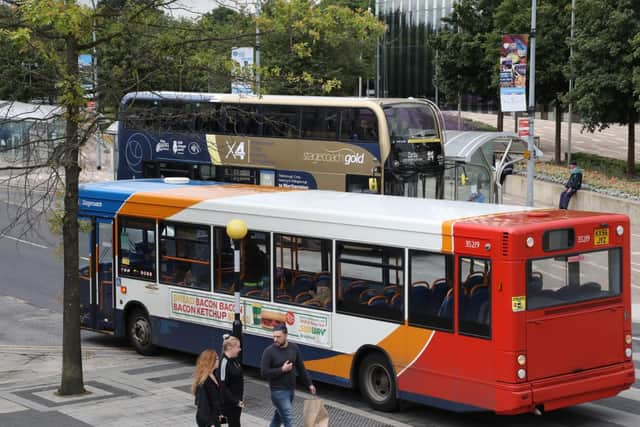Northamptonshire bus services could be cut amid 'cliff edge' of funding
and live on Freeview channel 276
Bus services in Northamptonshire are facing a funding 'cliff edge' which could result in cuts to services.
The north of the county's services are currently running at about 70 per cent of their pre-Covid passenger numbers. The Government has been providing extra money for bus companies who have been hit by a rise in homeworking and those avoiding public transport during the pandemic.
Advertisement
Hide AdAdvertisement
Hide AdBut that funding is due to end on March 31 - and local transport bosses are concerned this could have a dramatic effect on local bus services.


The news will come as a blow to those reliant on bus services who have seen multiple cancellations during recent months as Stagecoach have struggled to fill driver vacancies.
North Northamptonshire Council's enhanced partnership plan for the bus network was presented to members at the authority's recent Executive Advisory Panel for Climate Change, Environment and Growth meeting.
The plan includes a legal agreement between the council and operators that helps drive how the county will deliver better bus services for North Northamptonshire.
Advertisement
Hide AdAdvertisement
Hide AdThe services it pledges to maintain until 2025 include; the area's three bus interchanges; the Wellingborough Bus Gate; Eskdaill Street and Newland Street restricted roads in Kettering; and real-time bus information at stops.
NNC also proposes some new commitments including stepping down bus subsidies which are currently held at pre-Covid levels, an alternative fuel strategy and a three-year marketing plan.
Subject to extra Government funding, the authority also aims to reduce delays on Kettering to Desborough and Rothwell bus routes.
In return, bus operators will be asked to make a series of commitments including phasing out the most polluting buses in favour of more environmentally-friendly vehicles, introducing automatic vehicle location technology, installing CCTV on 80 per cent of services and maintaining core services between 7.30am and 6.30pm.
Advertisement
Hide AdAdvertisement
Hide AdThe report was presented by the council's Transport and Development Manager Chris Wragg who said: "In terms of the wider situation that the bus industry is facing, since March 2020 there's been a substantial loss of passengers.
"That had been building up so that by October time it had got up to about 75 per cent of pre-Covid levels. With the Omicron variant, the additional restrictions and people just being careful, that's dropped down to about 70 per cent of pre-Covid passengers.
"Commercial services have been maintained by direct Government funding to operators. Government is currently funding operators with a fixed amount of funding and expecting them to operate around 90 per cent of normal services
"There's an obvious funding gap if you've got 90 per cent of the costs and 70 per cent of the income."
Advertisement
Hide AdAdvertisement
Hide AdMr Wragg said that bus companies had also been aided by local authorities maintaining concessionary payments to operators at pre-Covid levels.
He went on: "The direct Government funding runs out on March 31 and the indication has been that the treasury did not wish to continue.
"Also, local authorities will have to reduce their concessionary fare payments in stages to 90 per cent of pre-Covid levels by April 6 and then by 5 per cent more every other month until current actual patronage is reached.
"The combined impact if that happens, it's almost been described by many of the operators as a bit of a cliff edge.
Advertisement
Hide AdAdvertisement
Hide Ad"What that's likely to mean is, I suspect, as has already happened to some extent because of things like driver shortages recently, is half hourly services (will be reduced) to hourly etc.
"But it's also possible that there could be some services completely commercially withdrawn, and that has impacts in terms of when the local communities might expect the council to step in and help."
Cllr Lyn Buckingham asked how a new generation of bus drivers will be trained.
Mr Wragg said: "Stagecoach have a record number of people going through their driving school at the moment."
Advertisement
Hide AdAdvertisement
Hide AdHe said that it was important to get people travelling on the bus again to stabilise the network and that the planned marketing strategy would be focused around persuading people that it was safe to travel on buses.
Executive Member for Highways Cllr Graham Lawman said that the council was looking closely at a co-ordinated demand response transport scheme to cover more areas to enhance public transport in the villages.